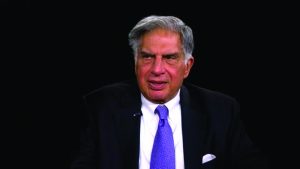 In a day of important developments, the National Company Law Appellate Tribunal (NCLAT) on December 18, 2019 restored Cyrus Mistry as Executive Chairman of Tata Sons while Tata Sons has announced that it would seek legal remedies. In view of this Tata Sons moves would be watched with interest in coming days.
In a day of important developments, the National Company Law Appellate Tribunal (NCLAT) on December 18, 2019 restored Cyrus Mistry as Executive Chairman of Tata Sons while Tata Sons has announced that it would seek legal remedies. In view of this Tata Sons moves would be watched with interest in coming days.
The stakes are high in this battle for control of a group with over $110 billion (7.8 lakh crore) in revenues, 29 listed companies under its belt, operations in 160 countries, and employing over 660,000 people. Future moves would be watched with interest by large shareholders and public at large and corporate sector as to how the Tata Sons companies are being run.
Shares of key Tata group companies tumbled on the BSE on December 18 following the NCLAT order. While Tata Motors fell over 3 per cent, Tata Steel 2.21 per cent, while Tata Communications was down 7 per cent at the close of trading.
Reacting to the NCLAT’s order reinstating him back as Executive Chairman of Tata Sons, Cyrus Mistry claimed, “It was a vindication of his stand”. He commented “Today’s judgment isn’t a personal victory for me, but is a victory for the principles of good governance and minority shareholder rights. The outcome of the appeal is a vindication of my stand.” Mistry said in a statement.
 “For over 50 years, the Mistry family, as the significant minority shareholder of Tata Sons, has always endeavoured to play the role of a responsible guardian of an institution that the entire nation is proud of. The outcome of the appeal is a vindication of my stand taken when the then board of Tata Sons, without warning or reason removed me, first as the executive chairman, and subsequently as a director of Tata Sons.”
“For over 50 years, the Mistry family, as the significant minority shareholder of Tata Sons, has always endeavoured to play the role of a responsible guardian of an institution that the entire nation is proud of. The outcome of the appeal is a vindication of my stand taken when the then board of Tata Sons, without warning or reason removed me, first as the executive chairman, and subsequently as a director of Tata Sons.”
By the same order, the NCLAT has also held the appointment of N Chandrasekaran as Mistry’s successor illegal. Cyrus Mistry, the 44-year-old son of Pallonji Mistry of the Shapoorji Pallonji Group had taken over as successor to Ratan Tata who had resigned his executive powers in the Tata group on December 28, 2012, upon turning 75. However, Mistry, sixth chairman of Tata Sons was removed as Chairman of Tata Sons in October 2016 and also removed as director on board subsequently.
A long legal battle ensued thereafter between Tata Sons and Mistry whose family owned 18 per cent stake in Tata Sons. Mistry had accused Tata Sons of oppressing minority stakeholder views and raised doubts over the functioning of the group.
When matter reached the National Company Law Tribunal (NCLT), it dismissed petitions filed by two investment firms, Cyrus Investments Private Limited and Sterling Investments Corp challenging Mistry’s removal from the position. Initially, he moved NCLT positioning himself as a victim citing minority shareholders rights and thereafter at the NCLAT.
Cyrus Mistry challenged NCLT order before the Appellate Tribunal — NCLAT. Mistry had argued that his removal was not justified under the Companies Act and also alleged that there was mismanagement of affairs in Tata Sons group. The NCLAT, which had reserved its order in July this year after a prolonged hearing, has now restored Mistry as the executive chairman of Tata Group. According to legal experts, Tata Sons can now file an appeal against the order in four weeks as the tribunal said the restoration order would be operational only after four weeks.
 In a statement issued by Tata Sons, the company said “The NCLAT order appears to even go beyond the specific reliefs sought by the Appellant. Tata Sons strongly believes in the strength of its case and will take appropriate legal recourse”.
In a statement issued by Tata Sons, the company said “The NCLAT order appears to even go beyond the specific reliefs sought by the Appellant. Tata Sons strongly believes in the strength of its case and will take appropriate legal recourse”.
It may be recalled that after the exit of Cyrus Mistry, Tata Sons board had brought in new independent directors such as private equity investor Amit Chandra and industrialists Ajay Piramal and Venu Srinivasan. It also saw his removal as director from all group companies almost simultaneously.
Mistry deftly converted the board-room drama into a battle between majority shareholder-versus-minority shareholder challenging decisions like converting Tata Sons from a public company into a private firm. The Registrar of Companies had given its go ahead in August 2018 to go private from a deemed public company since 1976 as per the provisions of the Companies Act.
The NCLAT has observed that the conversion from ‘public company’ to ‘private company’, the action taken by the Registrar of Companies was against the provisions of Section 14 of the Companies Act, 2013 and ‘prejudicial’ and ‘oppressive’ to the minority members and depositors, and is, therefore, considered illegal.
Focus would be on both Cyrus Mistry and Tata Sons as to how far the legal battle go? Will the acrimony end soon? Will all differences be sorted out amicably? After all at stake is the reputation of India’s most prestigious and oldest business conglomerate.
letters@tehelka.com












